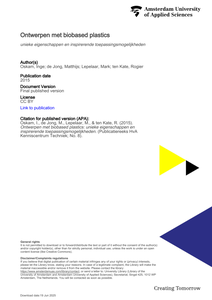Merk- en designadvies ter ondersteuning van de vormgeving van zes protoypes van een biobased e-scooter. Op basis van vier afstudeerscripties is een advies uitgebracht. Een samenwerking van het lectoraat CBRD met Inholland Delft Composietenlab, NPSP, Qwic/Vaneko en Waarmakers.
DOCUMENT
‘Ontwerpen met biobased plastics’ is de eindpublicatie van het project “Design Challenges with Biobased Plastics”. In dit onderzoeksproject deed de HvA, samen met diverse mkb-bedrijven onderzoek naar de kennis een tools die ontwerpers nodig hebben om biobased plastics, kunststoffen van hernieuwbare materialen, toe te passen. De publicatie gaat in op de kansen die biobased plastics bieden en biedt praktische tools, inspirerende voorbeelden en handreikingen die het ontwerpen met deze materialen makkelijker maken.
DOCUMENT

Dit boek is het resultaat van het SIA Raak MKB project “Biocomposieten voor civiele en bouwkundige toepassingen; Biobased brug”. Het is geschreven voor bedrijfsleven en studenten van het MBO, het HBO en de universiteiten. Het project leverde een haalbaarheidsonderzoek van een volledig biocomposieten voetgangersbrug. Materialenonderzoek bij Inholland Composites en stijfheid en sterkte berekeningen toonden aan dat een volledig biocomposieten voetgangersbrug haalbaar was. De Dommelbrug is met succes door ruim 100 studenten gebouwd.
DOCUMENT

The problem of single-use personal protective equipment (PPE) made from non-renewable resources polluting the environment encouraged the creation of a circular face mask. The main factors that influence the design of a face mask that protects the user from COVID-19 were investigated. According to the findings, these are filtration, fit performance, and comfortability. Therefore, the two following goals were set for this project, to design a face mask (1) produced in the Netherlands using 50% local circular materials and 50% recyclable materials and (2) that perfectly fits men's and women’s faces
DOCUMENT

Positioning paper bij de inauguratie van Vincent Voet als lector Circular Plastics.
DOCUMENT
![People. Planet. Polymer: een Wereld te Winnen [Inaugurele rede]](https://publinova-harvester-content-prod.s3.amazonaws.com/thumbnails/files/previews/pdf/20250506132442742072.Positioning20Paper20Vincent20Voet202024-thumbnail-400x300.png)
Fontys en Avans hebben in de afgelopen twee jaar onder meer laagdrempelige test- en onderzoeksmogelijkheden geboden, bijvoorbeeld in de vorm van afstudeerstages. Daarnaast hebben de beide kennisinstellingen een (regionaal) kennisnetwerk voor het MKB gefaciliteerd dat de mogelijkheid biedt om op nieuwe ontwikkelingen te anticiperen. Het is nu mei 2011 en het project loopt ten einde. In de afgelopen twee jaar is er veel bereikt: bedrijven en onderwijsorganisaties hebben elkaar gevonden, er is veel onderzoek gedaan naar nieuwe toepassingen van biopolymeren, aannames zijn getoetst en in het groeiende netwerk van producenten, leveranciers en consumenten van bioplastics is veel kennis gedeeld en uitgewisseld.
DOCUMENT

De nationale en internationale ambities op het vlak van Circulaire Economie zijn groot, en veel bedrijven en organisaties dragen bewust of onbewust reeds bij aan de Circulaire Economie. Een Circulaire Economie reguleert het fundamenteel anders omgaan met grondstoffen, door het hergebruik van producten en grondstoffen centraal te stellen en afval en schadelijke emissies naar bodem, water en lucht zoveel mogelijk te voorkomen. De belofte van de Circulaire Economie is om verschillende vormen van duurzaamheid op verschillende niveaus te organiseren als een liefst integrale economische opgave. Hierbij zijn het voorkómen van afval en het (her)waarderen van materie belangrijke uitgangspunten. Naast technische ontwikkelingen zijn hier ook sociale en zelfs systeeminnovaties bij nodig. Daar hoort bijvoorbeeld ook bewustwording, gedragsbeïnvloeding en zakelijke haalbaarheid bij. De transformatie naar een circulaire samenleving is een grootschalige maatschappelijke transitie. Hogeschool Inholland beweegt mee met deze ontwikkeling in de maatschappij, door middel van onderzoek en onderwijs in samenwerking met het werkveld. Deze position paper is een verkenning van bestaande theorieën, maatschappelijk debat, relevante beleidskaders en financieringsinstrumenten (het externe beeld), alsmede een eerste inventarisatie gericht op het aanbod binnen Inholland (het interne beeld), om daarmee een dialoog te initiëren over een betere positionering van Inholland op het vlak van Circulaire Economie. Als vervolgstappen worden o.a. een verdere inventarisatie van het aanbod en betere inbedding binnen verschillende opleidingen en een versterking en bundeling van onderzoekscapaciteit door middel van een domeinoverstijgende aanpak aanbevolen, alsmede een marktonderzoek om vraag en aanbod beter op elkaar te kunnen laten aansluiten. Mede op basis van deze bouwstenen kan de communicatie en positionering van Inholland op het vlak van Circulaire Economie, zowel intern als extern, verstevigd worden. Deze position paper is een groeidocument, dus de deur blijft open staan om in de toekomst nieuwe kennis, inzichten, aanbevelingen en interventies mee te nemen.
DOCUMENT

Uitgegeven dor QEAM (Verkenning op verzoek van Topsector Energie (Human Capital Agenda) en in opdracht van Rijksdienst voor Ondernemend Nederland. Learning communities is als denkmodel verder ontwikkeld door de topsectoren om in een veranderende context (samenleving, technologie, arbeidsmarkt, etc.) een nieuw perspectief te geven op een ‘leven lang leren en ontwikkelen’. De gedachte achter learning communities is dat leren, werken en innoveren in onderlinge interactie plaatsvinden met betrokkenheid van alle relevante partijen. Hierdoor ontstaan mogelijkheden om niet alleen de noodzakelijke vorderingen te maken met opbouw van kennis, maar ook het grootschalig verspreiden van kennis en kunde – onder andere via het opleiden van professionals – te stimuleren.
DOCUMENT

De transitie van het onderwijs in de foodsector in de Rotterdamse regio
DOCUMENT

Vanuit het project Step on the grass dat extern gefinancierd is door SIA is met partijen HempFlax en Donkergroen een prototype festivalgras ontwikkeld dat het gras bij festivals beschermt en de bodem verrijkt.
MULTIFILE
